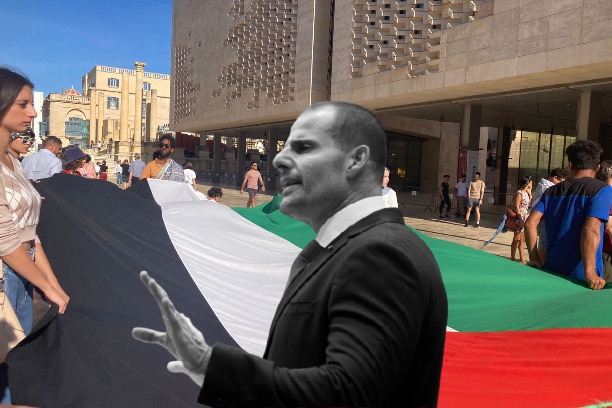 Robert Abela (Image by Miguela Xuereb) Background: Protestors holding Palestinian flag outside Parliament in Valletta (Image by Monique Agius)
Robert Abela (Image by Miguela Xuereb) Background: Protestors holding Palestinian flag outside Parliament in Valletta (Image by Monique Agius)Prime minister Robert Abela insisted on Wednesday that his government would keep its word and finally recognise the State of Palestine at the United Nations General Assembly (UNGA) in September, after missing its previous pledge to recognise Palestinian statehood by the end of June.
Back then, Malta was seemingly aiming to recognise the State of Palestine at a UN conference slated for 20 June. Abela had only taken that stance after two key western countries – France and the UK – had indicated that they would do the same. But when both changed their mind and the conference was postponed, Malta’s own courage was apparently found wanting and its self-imposed deadline came and went.
Once more, however, France and the UK have indicated their willingness to recognise Palestinian statehood, this time in September, seemingly giving Malta enough cover to once more follow suit.
This time round, however, Abela was adamant that Malta would stick to its promise, presumably even in the case that other countries change their mind.
Positive but late step, according to PN
Abela made his commitment while making a ministerial statement in Parliament, as Malta joined 14 other countries in confirming their intention to recognise the State of Palestine.
The general reaction of Nationalist Party MPs, as evidenced by the response of its leader Bernard Grech, was that this was a positive step, albeit a late one.
Grech and other PN MPs questioned why Malta felt the need to wait until September, insisting that immediate recognition was more appropriate. Shadow foreign minister Beppe Fenech Adami noted that three-fourths of the UN’s members already recognised Palestine – most of the rest are Western countries – and insisted that this was an obvious step to take if one truly believed in a two-state solution as Malta does.
Abela did not answer their queries as he brought the iscussion to a close, though in his opening statements he did insist that the 80th session of the UNGA in September presented “the most opportune time to have the greatest impact possible.”
But various MPs also argued that Malta should back punitive actions against Israel in light of its actions in Gaza, and not all of them came from the opposition benches.
Government backbencher Edward Zammit Lewis insisted that the time had come to discuss appropriate sanctions against Israel, insisting that “our children will not forgive us,” if nothing was done to address the plight of Palestinians.
Another government backbencher, Michael Farrugia, insisted that recognition of Palestine was not enough and rejected any suggestions that the present hostilities started as a result of the Hamas-led offensive into Palestinian territory on 7 October 2023.
He stressed that thousands of Palestinians had been killed and millions had been driven from their homelands over the decades as he explicitly described the present situation as a genocide: a term western politicians have generally proven reluctant to use.
PN MP Mario de Marco also made a point of using the word as he said that the world was witnessing a genocide and Malta needed to make its condemnation clear.
Abela did not answer queries on potential sanctions and the suspension of the EU-Israel Association Agreement in any particular detail, simply arguing that Malta’s position was that of the European Commission.
So far, the Commission – and the EU – is shying away from pushing for a suspension of the EU-Israel agreement, despite ample evidence that Israel is in breach of the human rights commitments set in the document. It is, instead, proposing merely partial suspension of Israel’s participation in the EU’s scientific research initiative Horizon Europe in reaction to this breach.
Despite the lack of a forceful stance, Abela nevertheless argued that the EU was inconsistent in its reactions to conflicts outside its borders, contrasting its reaction to Russia’s invasion of Ukraine with its reaction to Israel’s actions in Gaza.
While he insisted that it was important to back Ukraine and condemn Russia, he argued that the EU’s lack of a similarly forceful reaction of Gaza undermined its credibility.
“I don’t want the EU to lose credibility because of its inconsistent position between a war and another,” the prime minister said.
